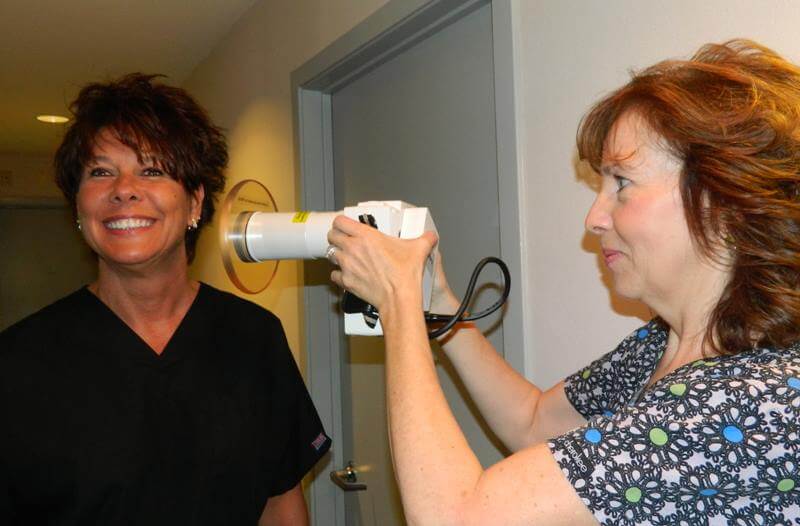
Want to convince yourself that we are going to be the best option for your dental implants then schedule an appointment with Pinnacle Center – Dental Implants & Periodontics today! We are happy to answer any other additional questions that you might have, and will work with you to find the best treatment for your unique situation.
Top Questions to Ask Your Implant Dentist
1. Is Your Implant Dentist A Board Certified Specialist?
It is known, and you probably have seen in your research, that any dentist with a diploma can legally place dental implants. But an implant specialist has additional surgical training because he or she remained in school for 3 or more years compared to a standard dentist to learn the proper skills in placing dental implants. Dental specialty boards require high standards of training and performance in order for a dentist to be certified by them. Successful applicants of this certification receive additional diplomas in their specialty. Once a dentist becomes “board-certified” they can then receive “diplomate” status in their particular specialties. This requires additional rigorous testing that must be passed from the specialty board. Periodontists, like Dr. Katherine L. Roll and Dr. Kelly B. Williams, take two to three years of residency training after four years of dental school. Drs. Roll and Williams are recognized as Top Periodontists in Pittsburgh, and are a Board-Certified Diplomats for the American Academy of Periodontology.
2. How Long Has Your Dentist Been Placing Dental Implants?
The extensive experience of your dentist in placing dental implants is vital for ensuring successful outcomes. At Pinnacle Center – Dental Implants & Periodontics, a track record dating back to 1985 highlights not only years of practice but also a wide range of handled scenarios, from routine to complex cases. This wealth of experience is crucial, as it indicates a profound understanding of various clinical situations, the ability to customize treatments, and the continuous refinement of techniques. By choosing a dentist with such a comprehensive background, you are leveraging their accumulated knowledge and commitment to excellence, which is essential for the quality of care and the success of your dental implant procedure. This depth of expertise ensures you receive treatment tailored to your specific needs, grounded in decades of learning and patient care.
3. How Many Dental Implants Does He or She Place A Year?
You want the dentist who places your dental implants to be experienced and knowledgeable in handling the most routine of procedures, as well as the most complex. There is a difference between someone that places 15 dental implants a year and someone that places hundreds every year. Pinnacle Center – Dental Implants & Periodontics has placed over 4,000 implants since 1985. Ask your dentist how many dental implants they have placed this year. Rookie or Master? You decide.
4. What Is Their Training In Dental Implants?
As frightening as it may seem, many dentists today only take a one or two-day course on dental implant placement, work on plastic model jaws and/or buy surgical dental implant kits to get started. What is even more frightening is the fact that some dentists surgically place dental implants on unsuspecting patients with little to no training whatsoever. You should ALWAYS check to make sure your dentist has the proper training, experience and credentials. A board certified surgeon spends 3 to 4 years after dental school to become properly trained. You are not purchasing a toaster. You are reconstructing a part of your body and Experience Truly Matters. Ask your dentist about their training
5. Does Your Implant Specialist Show You Before and After Photos of Cases That They Have Done?
Anyone can show you a picture in a dental journal or in a textbook. The best implant dentists routinely photograph and document their cases to learn, teach and brag. Yes, that’s right, to brag. Here at Pinnacle Center – Dental Implants & Periodontics, we love all of our success stories and show them proudly. Ask your dentist to see actual cases before you choose them as your implant dentist. (See OUR SUCCESS STORIES)
6. Can You See A List of The Continuing Education Courses That Your Dentist Has Taken In The Past 12 to 24 Months?
All state licensing boards establish minimum standards of practice in the dental community for specialty practices and procedures. Despite the efforts of the state licensing boards, these efforts do not always guarantee that your dentist is qualified to perform any specialty procedure, especially when it comes to placement of dental implants. A dentist that actively pursues excellence in dental implant care will spend 50 to 100 hours or more a year in continuing education and study, to hone, refine and update their treatment skills. Make sure that your dentist measures up. Ask to see the list of courses. Dr. Roll and Dr. Williams routinely spend numerous hours each and every year in continuing education.
7. Does Your Dentist Offer A Comprehensive Initial Exam Prior To Diagnosis and Treatment?
A dentist that only looks at your missing tooth or teeth is not interested in your long-term dental health or success of your dental implants. You should always make sure your initial exam includes the following evaluations:
- An oral cancer screening
- Examination of the health of your gums
- A complete bite evaluation including patterns of looseness, tooth wear and overall bite function.
- TMJ function
- Adequate size and shape of the bone and adequate amounts of gum tissue in the area of the proposed implant
8. How Many Dental Implants Does The Dentist Keep On Hand?
There are many situations that call for different implant sizes than were originally planned. A dentist that places hundreds of dental implants a year will always have 30 to 50 additional implants on hand to address unforeseen changes in your treatment situation. A dentist that only orders dental implants for individual cases may not be able to handle every situation that may arise.
9. Does The Dentist Have The Latest Technologies To Give The Best Diagnoses and Treatment?
 Advanced technologies and the latest science not only offers faster diagnosis and treatment, but also ensures a more effective course of treatment. Some of the latest technologies and treatments available used by us to maximize the effectiveness of your treatment include: (See OUR TECHNOLOGY.)
Advanced technologies and the latest science not only offers faster diagnosis and treatment, but also ensures a more effective course of treatment. Some of the latest technologies and treatments available used by us to maximize the effectiveness of your treatment include: (See OUR TECHNOLOGY.)
- Digital X-rays: Make the surgery faster, safer and more predictable (it takes 4 seconds to see a digital image).
- SimPlant and Implant Logic Cat Scan Software systems that allow us to view 3-dimensional computer images of the jawbone to properly plan and perform successful dental implant treatment. He can visualize your implant surgery on the computer before performing the actual treatment.
- Platelet Rich Plasma: A treatment that utilizes your own blood platelets to promote better and faster healing after a surgical treatment.
- Growth Factors: enhances the speed and the quality of healing process.
- Laser Surgical Options
10. What Brand of Dental Implants Does The Dentist Use?
The fact is that very few dental implant companies have been researching the science of dental implants for over 20 years, and most copycat companies that are manufacturing low-quality knock-off implants, market to dentists as a low-cost option. Ask yourself: Do you want an implant from a company that promotes being the low cost leader? Or would you want to go with dental implants that are from a worldwide leading company with 20 years of research and science? Better yet, ask your dentist! Beware of them saying: “Brand x is “just as good!” because it’s not.
10.5. Do You Trust Your Dentist To Do The Right Thing & Do The Thing Right?
If you need a complex procedure like a bone graft or a sinus lift does your implant dentist have the latest and the best training for that procedure? Do they have a long track record of success?
Keep this in mind: the decisions that you make today will affect you for the rest of your life so make them carefully – if you are making your decisions mainly based on the costs involved and if you decide to compromise and take a short-cut you may just get what you pay for. So, think about this: If you think you can’t afford to do it right the first time how will you be able to afford to do it over? It is very costly to try to recover from treatment that has not gone right and when that happens it will cost you 2 to 3 times more than had you done it right the first time. Remember, this is not a toaster from Amazon. This is a professional surgical service being performed on your body that you want to last for decades. Learn more about the costs of dental implants.






